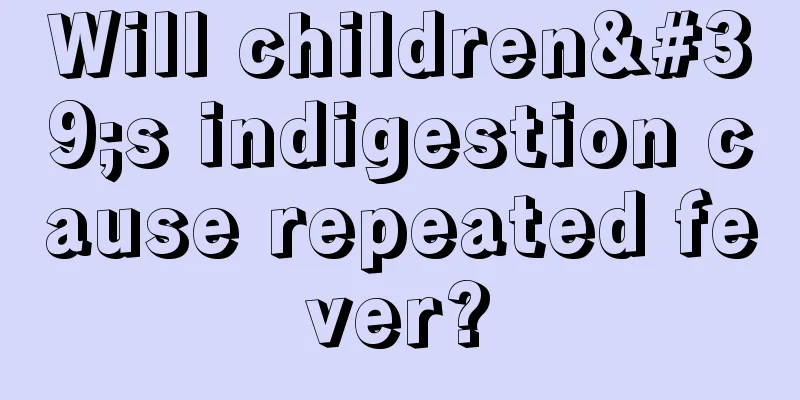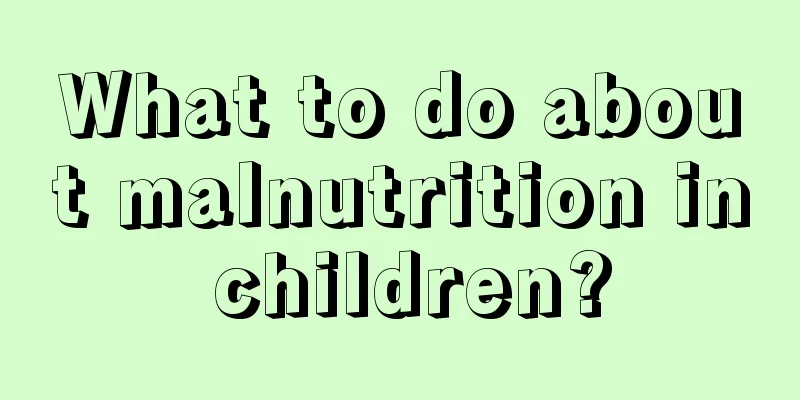Will children's indigestion cause repeated fever?

|
I believe many mothers have encountered the problem of baby's food accumulation. You should know that children's food accumulation is not just about feeling abdominal distension, or occasional diarrhea, nausea and vomiting. Children will also have symptoms of repeated fever, such as a high fever that starts again just a few hours or a day after the fever subsided. Therefore, fever is not necessarily related to a cold, and it may be caused by several other factors. Causes of fever in children 1. Respiratory tract infection: It is the most common cause of fever in children. Children often show a history of colds, and also have runny nose, sore throat, cough, fatigue, headache, muscle pain and other discomforts. 2. Gastrointestinal infection: The child may have a history of unclean diet, accompanied by symptoms such as nausea, vomiting, abdominal pain, and diarrhea. 3. Urinary tract infection: The child may cry and be restless, have abdominal pain, or have hematuria, frequent urination, and urgency to urinate. Red and white blood cells can be seen in urine routine. 4. Surgical acute abdomen: fever, abdominal pain, vomiting, diarrhea, increased blood count, and significantly increased C-reactive protein may occur. Children's abdominal pain symptoms are not obvious, and they sometimes cry and are restless and in poor spirits, which can easily lead to misdiagnosis. We must attach great importance to it. Needs close observation. What should I do if my child has a fever? If a child has a fever, you must first find out the cause of the fever. Normal tests include routine blood tests, routine urine tests, routine stool tests, blood biochemistry, some pathological tests, abdominal color ultrasound, chest and abdominal X-ray examinations, etc. Only when the cause of the fever is clear can symptomatic treatment be given. Appropriate treatment plans should be selected based on the test results, including anti-inflammatory and antiviral treatment. General treatment includes paying attention to rest, drinking plenty of water, and ensuring adequate sleep. Eat a light diet. If it is a gastrointestinal infection, you should also pay attention to fluid replacement to prevent dehydration and protect the intestinal microecology. Urinary tract infection usually does not have obvious urinary tract irritation symptoms, so if there is abdominal pain and fever, routine urine tests must be performed. The treatment period is long, generally 10 to 14 days. |
<<: Recurrent fever in children with viral infection
>>: 5 year old child wetting the bed
Recommend
What are the symptoms of viral colds in infants and young children?
Viral colds in infants and young children are ver...
What to do if premature babies have abdominal distension
The digestive system of premature babies is not f...
What to do if your child has a fever for no reason?
Every child will always encounter some health pro...
Are growing beans poisonous?
Growth beans are actually a kind of toy, which we...
Is it normal for a baby to poop once a week?
Eating is one of the important components that en...
What to do if your child is stingy and selfish
As we grow up, different life experiences and fam...
What is the height and weight of a four-month-old baby girl?
Children nowadays grow very fast. Although they o...
Six month old baby with diarrhea
The baby's health is the most important thing...
What is childhood paralysis like?
Many children have contracted polio without their...
What can children eat to get better quickly when they have a fever?
Children cannot eat seafood, eggs, or soy product...
How can children increase their immunity?
Children are physically weaker and have poorer re...
The best way to treat chickenpox
Most of us will be accompanied by illnesses of va...
Newborn baby convulsions
Children's bodies are relatively fragile, so ...
How to eat chicken liver for babies?
During the development and growth stage, babies s...
Three-year-old baby has red pimples on his body
Three-year-old babies have relatively low resista...









